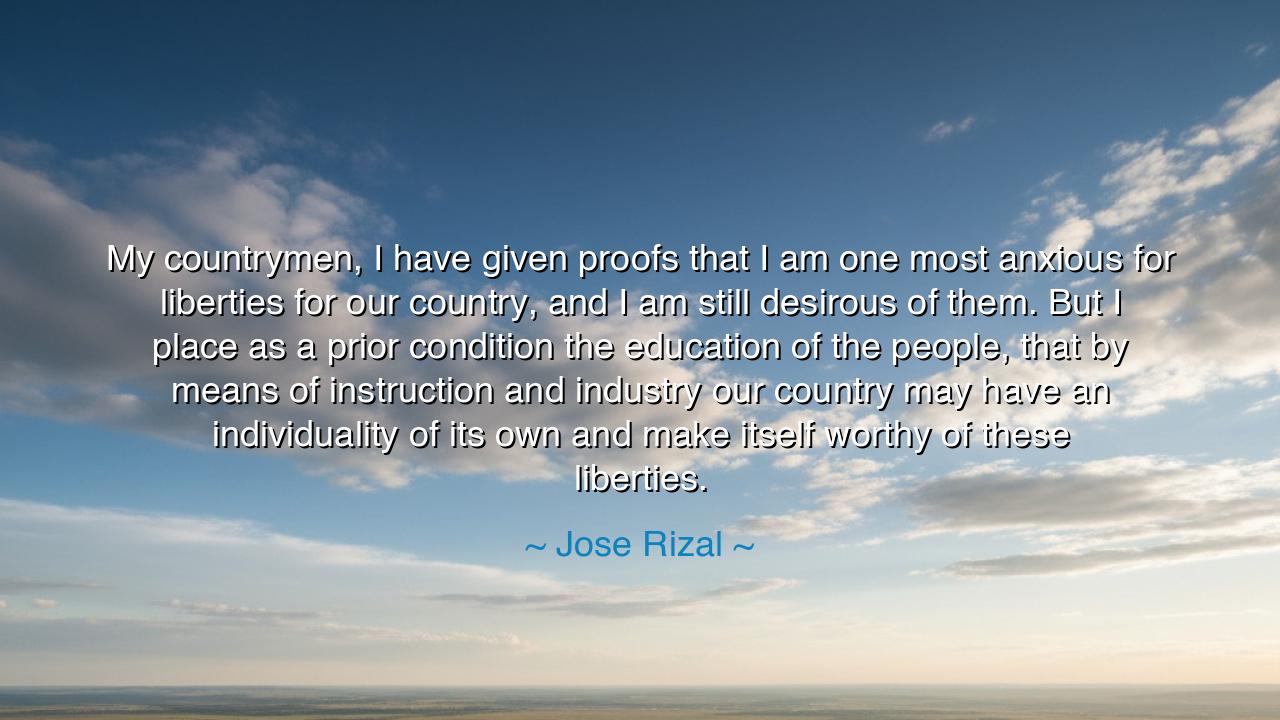
My countrymen, I have given proofs that I am one most anxious for
My countrymen, I have given proofs that I am one most anxious for liberties for our country, and I am still desirous of them. But I place as a prior condition the education of the people, that by means of instruction and industry our country may have an individuality of its own and make itself worthy of these liberties.






Hear the voice of José Rizal, the great martyr and prophet of the Philippines, who wrote with pen sharper than any sword: “My countrymen, I have given proofs that I am one most anxious for liberties for our country, and I am still desirous of them. But I place as a prior condition the education of the people, that by means of instruction and industry our country may have an individuality of its own and make itself worthy of these liberties.” These words are not idle musings of a dreamer, but the solemn wisdom of one who gave his life for his nation’s freedom. He teaches here a truth that echoes across the ages: liberty without education is fragile, like a tree without roots.
For Rizal loved liberty, yet he knew it could not endure unless the people themselves were prepared to bear its weight. To be free is not merely to cast off chains; it is to govern oneself with wisdom, to build a society with justice, and to protect the dignity of all. And this, he said, cannot be done without education. The ignorant, though freed from foreign rule, may fall into new chains—those of corruption, division, or tyranny of their own making. But the educated, disciplined by instruction and strengthened by industry, are able to wield liberty as a sacred trust.
Rizal’s life itself is testimony. Born under the shadow of Spanish colonial rule, he pursued learning in Manila, Madrid, Paris, and Heidelberg. He saw that knowledge broadened the mind and gave courage to resist oppression. He wrote novels like Noli Me Tangere and El Filibusterismo, which exposed the injustices of colonial rule and awakened the conscience of his people. Yet he did not call for immediate revolt without preparation. Instead, he called for education, believing that only through enlightenment could the Filipino people forge an identity strong enough to sustain true freedom.
History has proved him right. Many nations have won independence through blood and fire, only to collapse into disorder when their people lacked the foundations of education. Consider the French Revolution: though it destroyed the old order, ignorance and unpreparedness led to terror, instability, and the rise of new tyrants. Contrast this with nations that paired independence with widespread learning—such as Japan in the Meiji era, which rapidly modernized by investing in schools and industry, and thus transformed into a world power within a single generation.
The meaning of Rizal’s words is therefore clear: liberty must be earned not only by courage but also by wisdom. A free people without education may squander their freedom. But a free people with education can shape their own destiny, protect their sovereignty, and command respect among nations. To Rizal, liberty was not a gift to be seized; it was a responsibility to be prepared for, through knowledge and work.
This teaching carries a warning for all generations. If a nation neglects the education of its people, it risks losing the very freedom it treasures. Ignorance breeds corruption, apathy, and division. But when the people are instructed in history, science, morality, and industry, they become guardians of their own liberty. The chains of ignorance are as dangerous as the chains of foreign masters, and only education can break them.
Therefore, O listener, take this wisdom to heart. If you love your country, do not only demand rights—demand also the spread of education. Support schools, honor teachers, cultivate your mind, and work diligently. For in strengthening your mind, you strengthen your nation. Liberty without learning is like a sword in the hands of a child; but liberty guided by wisdom is the strength of a people who cannot be conquered.
Thus, remember the cry of José Rizal: that education is the prior condition of liberty. Let us strive not only to be free, but to be worthy of freedom. Let us build nations rooted in knowledge and industry, so that liberty, once gained, may endure for generations, a light that no darkness can extinguish.






AAdministratorAdministrator
Welcome, honored guests. Please leave a comment, we will respond soon